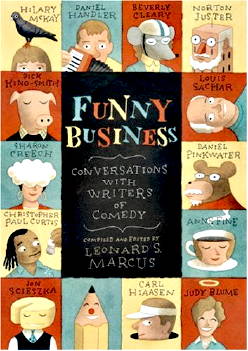Review of Funny Business: Conversations with Writers of Comedy
by Leonard Marcus
Contents
| Comments | To Buy
Purple
Crayon Bookstores
Book
Reviews Index Page

|
|
Funny Business is a collection of 12 (not 13 as descriptions of the book state--see below) interviews with children's book authors known as writers of humor.
Contents of Funny Business: Who is included? Quite an impressive list: Judy Blume, Beverly Cleary, Sharon Creech, Christopher Paul Curtis, Anne Fine, Daniel Handler (Lemony Snicket), Carl Hiassen, Norton Juster, Dick King-Smith, Hilary McKay, Louis Sachar, and Jon Scieska; mostly American, mostly writing novels. The 13th author, Daniel Pinkwater, appears only in a short note that explains why he isn't giving an interview.
The interviews are lengthy, and not only or even mostly about writing humor, but about the writers' childhoods and personal experiences, especially as refracted in their stories, their early writing experiences, how particular stories came about, well-known characters they created, their writing and revision process (including some tips about writing), and other subjects.
Take the interview with Sachar, the author of Sideways Stories from Wayside School and Newbery-Medal-winner Holes. Marcus begins by asking "what kind of child were you?" and we learn that Sachar was "pretty happy" in elementary school, but "was on the outs" in middle school, where he ended up outside the cool group. He says "I write about that now because I lived through it." The conversation then moves into an account of his decision to leave behind his intended career as a lawyer to concentrate on writing, a decision he only fully committed to after publishing a few books. Sachar then discusses how he came to write some of his books, such as Dogs Don't Tell Jokes, which he wrote about characters from a previous book to "give the characters a second chance"; and goes on to talk about what he sees of himself in the book's main character, Gary. Sachar notes that his "first instinct is to write humorously," but he does not explain how he does it. In fact, he says that "it's hard to say why I write certain things.... I feel almost like I'm in a hypnotic state." Towards the end of the interview, Sachar recounts at some length the process of writing Holes, which started without a plan, but with the idea of the camp, before he even had any characters in mind. From there he created characters, and began writing, without knowing where the story would end up. The story took more or less its final shape by the third draft.
Each interview also includes a photograph of the author as an adult and as a child, a reproduction of marked-up manuscript page, editorial letter, or something similar, and a list of the author's books.
In all of this, I didn't find the answer to the rhetorical question asked by Marcus in a brief introduction: "What makes funny funny?" And perhaps that's the point; writing humor doesn't follow a certain formula or set number of steps. As we learn in the interviews, writing humor springs from who we are and from our own experiences.
Comments I'm always telling aspiring and published writers that it's important to keep up with the field--for inspiration, for ideas, for knowledge of what's getting published. To do that, it's not enough to keep up with the reviews in Publishers Weekly and Booklist, or pay attention to the award-winning books at the end of each year. You need to learn about the context, and the people, which reference books such as The Essential Guide to Children's Books and Their Creators or A Family of Readers help you to do. To go into depth, though, books like Funny Business seem to me to be necessary. It's not the only book about children's books that Leonard Marcus has written, either. He wrote Minders of Make-Believe, which is a fascinating history of children's book publishing in America. And he wrote a number of others, some of which I list in this selective bibliography of books by Leonard Marcus.
Like those books, Funny Business does not contain much practical how-to information. But it is extremely revealing about the very different ways that writers go about doing what they do, from their sources of inspiration to their writing process. If those subjects interest you, you'll find much of interest in this book.
Who Needs Funny Business: Promotional copy for the book says that it is intended for "children and adults alike." This is an accurate statement--the book is for children who want to know more about a favorite writer, and, as I suggest above, for adults who write themselves, or who are otherwise involved in the creation of children's books....
Disclosure: I received a review copy of this book for free from the publisher, as do most reviewers. I also know Leonard Marcus, but have tried to look at the book as objectively as I can.
Where and How to Purchase Funny Business :
- Buy Funny Business at Amazon, a major online retailer, which usually sells the book at a 30% discount, though this can vary.
- Buy Funny Business through IndieBound, a program of the American Booksellers Association. You can have it delivered or pick it up at your local independent bookstore.
- Buy Funny Business at Amazon Canada, if you live in Canada.
- Buy Funny Business at Amazon UK, if you live in the UK: this crosses the Atlantic well, as have Gail's novels.
You can, of course, also purchase this at any bookstore. If they don't have it in stock, they can order it for you.